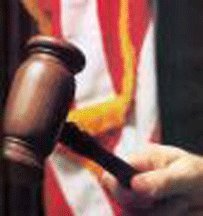IT'S ILLEGAL AND IT'S SCARY
 The ACLU deconstructs the president's legal arguments in defense of his illegal spy program and suggests an answer to the question, "Why did he do it?" Read the whole thing for the legal details.
The ACLU deconstructs the president's legal arguments in defense of his illegal spy program and suggests an answer to the question, "Why did he do it?" Read the whole thing for the legal details.But, President Bush would sweep aside this entire body of democratically debated and painstakingly crafted restrictions on domestic surveillance by the executive branch with his extraordinary assertion that he can simply ignore this law because he is the Commander-in-Chief. In a December 17 radio address, for example, Bush asserted that the spying was "fully consistent with my constitutional responsibilities and authorities." But his constitutional duty is to "take care that the laws be faithfully executed" (Article II, Section 3); the law here clearly establishes well-defined procedures for eavesdropping on U.S. persons, and the fact is, Bush ordered that those procedures not be followed.
Government eavesdropping on Americans is an extremely serious matter; the ability to intrude on the private realm is a tremendous power that can be used to monitor, embarass, control, disgrace, or ruin an individual. Because it is so invasive, the technology of wiretapping has been subject to carefully crafted statutory controls almost since it was invented. Ignoring those controls and wiretapping without a court order is a crime that carries a significant prison sentence (in fact, criminal violations of the wiretap statute were among the articles of impeachment that were drafted against President Nixon shortly before his resignation).
Clearly Illegal
Unfortunately, although the law in this matter is crystal clear, many Americans, faced with President Bush's bold assertions of "inherent" authority for these actions, will not know what to believe. There are only 5 points they need to understand:
Point #1: Electronic surveillance by the Government is strictly limited by the Constitution and Federal Law
...
Point #2: There are only three laws that permit the government to spy
...
Point #3: The Bush-NSA spying was not authorized by any of these laws
...
Point #4: Congress's post-9/11 use-of-force resolution does not legitimize the Bush-NSA spying
...
Point #5: The need for quick action does not justify an end-run around the courts
...
Given the extensive (indeed, excessive) surveillance powers that the government already possesses, the Administration's blatantly illegal use of warrantless surveillance raises an important question: why? One possibility, raised by the New York Times in a Dec. 24, 2005 story ("Spy Agency Minded Vast Data Trove, Officials Report"), is that the NSA is relying on assistance from several unnamed telecommunications companies to "trace and analyze large volumes of communications" and is "much larger than the White House has acknowledged."
This, as security expert Bruce Schneier has noted, suggests the Bush Administration has developed a "a whole new surveillance paradigm" - exploiting the NSA's well known capabilities to spy on individuals not one at a time, as FISA permits, but to run communications en masse through computers in the search for suspicious individuals or patterns. This "new paradigm" may well be connected to the NSA program sometimes known as "Echelon," which carries out just that kind of mass collection of communications (see www.nsawatch.org). This "wholesale" surveillance, as Schneier calls it, would constitute an illegal invasion of Americans' privacy on a scale that has never before been seen. (See Schneier, "NSA and Bush's Illegal Eavesdropping," Salon.com)
According to the Times, several telecommunications companies provided the NSA with direct access to streams of communications over their networks. In other words, the NSA appears to have direct access to a large volume of Americans' communications - with not simply the assent, but the cooperation of the companies handling those communications.
We do not know from the report which companies are involved or precisely how or what the NSA can access. But this revelation raises questions about both the legal authority of the NSA to request and receive this data, and whether these companies may have violated either the Federal laws protecting these communications or their own stated privacy polices (which may, for example, provide that they will only turn over their customers' data with their consent or in response to a proper order).
Regardless of the scale of this spying, we are facing a historic moment: the President of the United States has claimed a sweeping wartime power to brush aside the clear limits on his power set by our Constitution and laws - a chilling assertion of presidential power that has not been seen since Richard Nixon.
Tags: Bush, ACLU, illegal NSA spying, telecommunications





0 Comments:
Post a Comment
<< Home